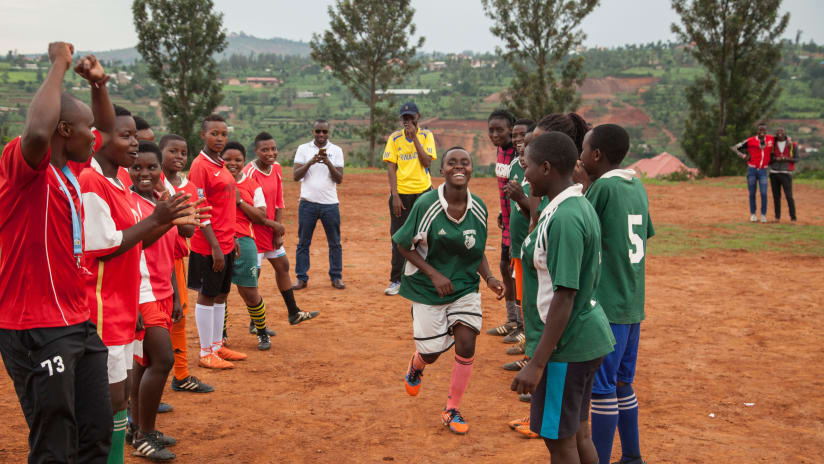Space brings people together because it gives them a way to connect. When you can have a defined place to coexist with others you have a defined relationship. Which means, by extension, that you have a community.
The children and young people of Togetherness Youth Cooperative in Kigali, Rwanda chose to exist in a space together where they could play soccer. And from that choice, their space has continually grown to include a larger and larger community. Now through the help of donations, non-profits, the Portland Timbers and the members’ decision to find each other on the soccer field, Togetherness will have their largest space yet — a Phase I regulation junior pitch with a top-class playing surface worthy of a community that grew from out of the country’s rough terrain.
They burst through the door. Five or six men. Eric couldn’t do anything to stop them. They were armed.
And now they’ve ordered him and his roommate to the floor while they ransack the place. Eric has tried repeatedly to tell them he is nothing more than a soccer player. He has no interest in politics. He tries to explain that he’s a goalkeeper for Rayon Sport, Rwanda’s biggest club. The men don’t believe him. They tell him that lying will only get him killed faster.
They don’t know if Eric is a soccer player or a politician, but they do know he is a Tutsi. And because he is a Tutsi, he is going to die.
Rwanda is more than the genocide that occurred in 1994, but its people are still affected by it every day. It looms. It’s estimated that one million Rwandans were murdered over the course of 90 days. Most were Tutsi, an ethnic group primarily found in Rwanda and the neighboring country of Burundi.
The country has done much to recover from that intense horror, but there is still deep poverty, and lingering trauma. And when that trauma exists, for any reason, a place to forget and connect becomes necessary.
In the aftermath of the genocide, 21-year-old Steven Turikunkiko, an orphan himself, felt for the children who had lost their parents. He didn’t have much to his name, but he gathered the children as he could and helped how he could. He brought them together to sing songs and play games like soccer.
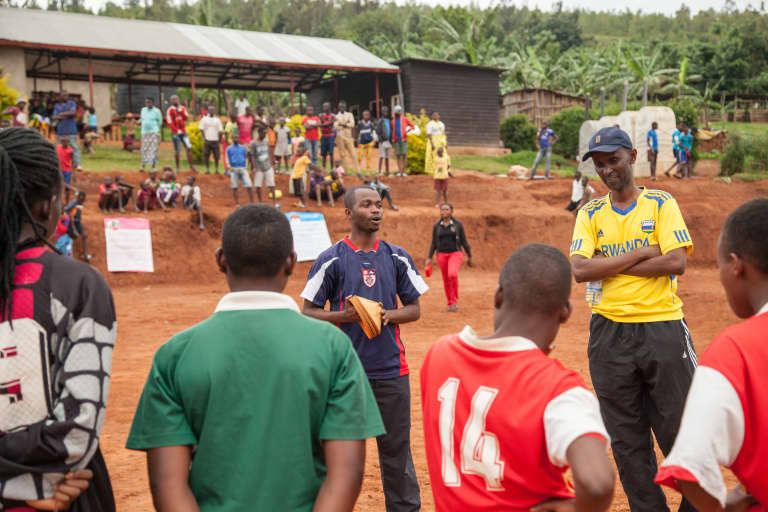
Genocide survivor Eric Murangwa host a coaching seminar on the Togetherness field | African Road
Eventually the group that grew out of those games began raising themselves. Eighty kids with nowhere to go established child-headed households with Steven’s help. The older kids raised the younger kids. And they called their group the Togetherness Youth Cooperative.
Eric began playing soccer as a young kid in Kigali. His father supported Rayon Sports F.C., Kigali’s home club and the biggest team in Rwanda. That meant Eric supported Rayon Sports and that when he had time he would go watch the team train. They didn’t mind. An extra ball boy never hurt.
One day, Rayon Sports’ keeper didn’t show up in time. Eric, 12 and tall for his age, did. He’d already taken his customary spot behind the goal. The team told him to go ahead and come onto the field. “Toto” — the Swahili word for Young One — ”stand in goal.” He could at least take up space.
The stints in goal became more regular. Eventually, they let Eric take part in drills, too. By the time he turned 15, “Toto” had earned a place on the squad. He would become one of the most beloved players in club history and a player for the Rwandan national team. But the men who were ransacking his home didn’t recognize him. Not yet anyway.
As they tore apart the house, a photo album fell onto the floor. One of the men examined it. He saw pictures of Eric in his Rayon Sports uniform. Pictures of him with teammates and with opponents and of his travels as one of the most popular players in the country.
The man lowered his gun.
“Are you Toto?” he asked Eric.
“Yes.”
“Well why didn’t you tell me?”
The kids of Togetherness did what they had to to earn money. Whether that meant working in a market or manual labor or any number of things, they worked. But at the end of the day they came together to play soccer. Steven would be there to help out as he could. But no matter what, they had somewhere to go, and something to look forward to.
The kids originally played in the back lot of a church. A dirt patch really. They would play when they could but if the church needed the lot, the kids would have to abandon their space. It wouldn’t be until 2011 that Togetherness would get some help finding a field of their own.
They’d get that help from African Road, a non-profit organization based out of Portland that began in 2010. Kelly Bean and Lori Martin co-founded the organization with helping Togetherness in mind. She met Steven and the rest of Togetherness in 2007 through a mutual friend and immediately saw the incredible work they’d done to make a way for themselves.
“Steven came up with solutions by bringing people together. So I went home from that trip and thought, I want to learn from that guy,” Bean said. “I have such respect for the level of sacrifice and determination and love and pure intuitive wisdom that it takes for people to be well and thrive together that he had committed his life to. It was Steven and his faithfulness that sparked African Road to be formed three years later.”
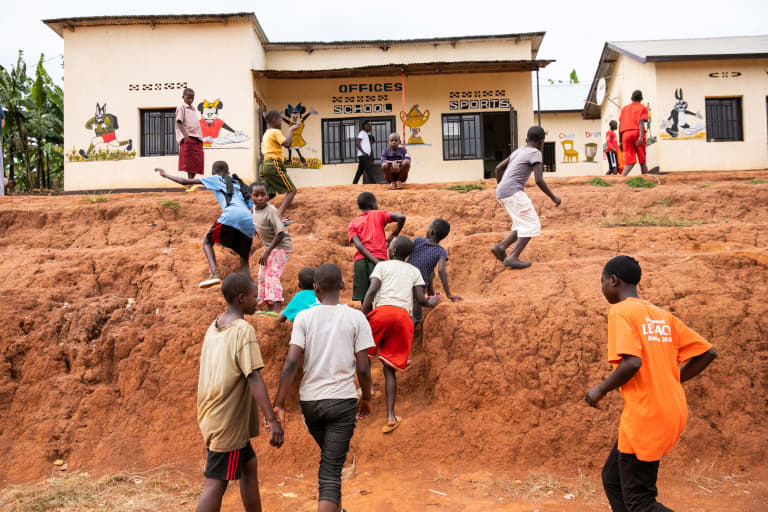
Children climbing a large slope at the Togetherness field before steps were built with the help of donations | African Road
The formal creation of African Road allowed Bean to raise money and truly invest in Togetherness in a more effective way. They’ve helped provide clean water, education and teacher training and small business initiatives — all formed with a focus on helping the cooperative become self-sustaining. African Road has since grown to include collaborative projects in Kenya, Burundi and Tanzania, but Togetherness remains at the heart of what they do. And at the heart of Togetherness is soccer.
So when Togetherness, still playing in the lot behind the church, asked for a new place to play, African Road raised money to help. And in 2011, they were able to buy six acres of land. But there was a slight problem: a less than slight incline.
They’d bought a hill.
Which isn’t completely surprising. Rwanda is “The Land of A Thousand Hills.” There’s not much you can do about what you buy. But you can change what you have.
So the kids of Togetherness dug their field. Over the next three months they carved out a huge terrace in the hillside. Entirely by hand.
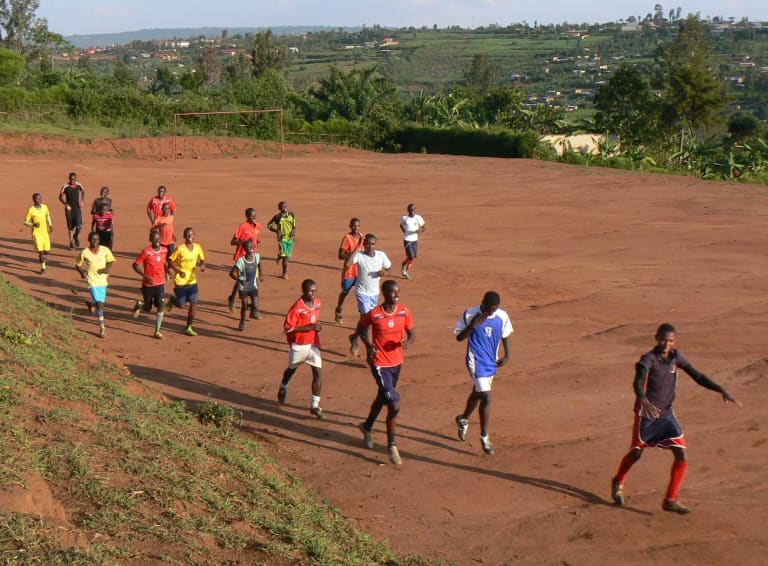
A photo from 2013 shows training on the field carved out of the hillside | African Road
The men let Eric and his roommate go after talking about the match from a couple of weeks prior. Eric convinced them his roommate also played for Rayon Sports. Eric also convinced them that his neighbors should be left alone. They couldn’t convince them the same about a young housekeeper who lived with them. He was 16.
Over the next few weeks, Eric stayed with non-Tutsi teammates who helped keep him safe. Eventually, he made it to the famous Hotel Des Milles Collines where a United Nations worker helped him escape to a safe zone outside Kigali.
Eric made it through the genocide. His seven-year-old brother, six uncles and several teammates, did not. He left the country for England. His playing career was over, but in England he’d start an organization called Football For Peace Hope and Unity — a non-profit that used the game that saved his life to help others. In 2013, the organization would eventually bring him back to Kigali. He wanted to see Togetherness for himself.
“I had been told a little bit about a story about how the place was built on the back of football. When I went to the place, I couldn't believe it, how incredible the story was. And from there on we made a formidable relationship,” Eric said.
Soccer very literally saved Eric’s life. Now he got to see how it had changed the lives of the kids of Togetherness.
His organization began hosting soccer clinics at the Togetherness field. Still dirt, but at least level now. They helped get the volunteer coaches at Togetherness training from more experienced coaches. And, along with African Road, helped Oscarie Iragena, one of the few women’s coaches in Rwanda, to begin making regular visits out to the field to do clinics with the girls of Togetherness. Sixty-six girls in the Cooperative, now made up of 142 orphaned either by the genocide or its resulting issues, have learned soccer and more.
“Not only was she coaching them how to be good soccer players, but she was using her coaching and her training to be able to change their own orientation to what it means to be a girl in Rwanda,” Bean said.” And so instead of kind of showing up on the field and looking down with no eye contact and with tiny voices, I’ve watched that group of girls over the past two years or so now be young girls who stand up strong and look you right in the eye and who can feel confident.”
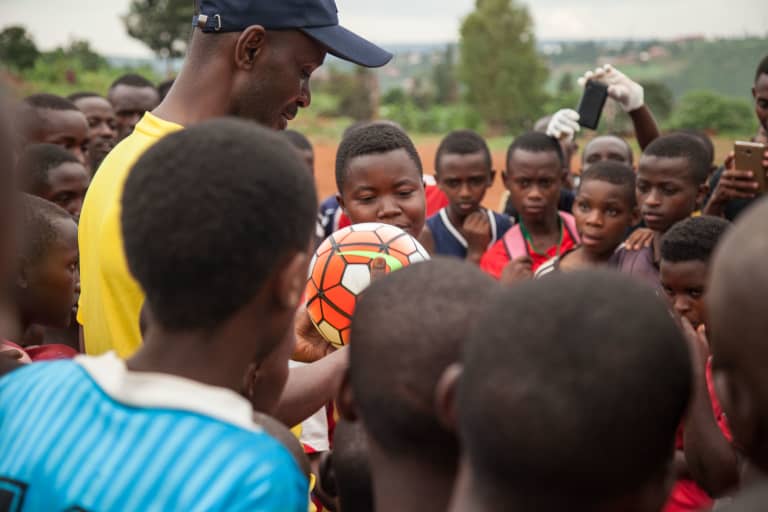
Former Rwanda national team player and genocide survivor Eric Murangwa gives a coaching seminar on the Togetherness soccer field | African Road
Unfortunately, the field where the girls of Togetherness learned to play, the one the kids dug out of a hill, hasn’t handled weather, time and a lot of games well. So when African Road asked what their next project could be for Togetherness, the kids responded with an idea for a FIFA regulation pitch with a much-needed surface upgrade.
The idea didn’t seem attainable at the time. But two and a half years ago, a brutal season of rain made it almost necessary. The level playing field they had built was in danger of washing off the hillside. So they began the process of designing a new field. And assessing the cost.
They set a $250,000 goal because of the extensive retaining walls and drainage that would be needed. They would need a lot of help to reach it. In came the Timbers.
Since the Timbers’ inaugural season in 2010, the club has built 16 soccer fields and futsal courts for communities underserved in recreational activities for kids in the Portland area. The project is called Fields For All.
When Mike Golub, the Timbers’ President of Business heard that Portland-based African Road needed funds for a field, he decided that Fields For All meant Kigali too.
“We weren't necessarily looking beyond our region. But when this project came along, there was this wonderful nonprofit born here in Portland who were born the same year that we were born doing an incredible field project in a place of need in another part of the world,” Golub said. “It just seemed like a really natural, natural extension of the work we had been doing for the last decade here in Portland.
So far, with a $50,000 grant from the Timbers and Thorns Stand Together, Fields for all program, along with other contributors, they’ve been able to raise $236,000 for the field. There’s still 10% left to go to meet the overall goal, but the money raised allowed the Timbers, African Road and Togetherness to break ground and make significant headway.
The field will allow for sustainability. Togetherness will be able to rent the field, host tournaments and perform clinics that will provide income for the community. But most importantly it will give the kids of Togetherness a permanent place to play. A reminder that a community built on the foundation of a game can be enough for life-changing, life-saving change.
“It means everything. It will empower them. It will give them a sense of belief that this family, this community is here to stay,” Eric said. “Having the field today will remind this generation that they have to continue to believe in themselves and have to know that they will also have to pass on what they've learned today to the next generation.
“When you use the power of sports to try and deal with these challenges that we have to carry because of our past, it helps. It helps the younger people especially to overcome these challenges. It makes sure that the younger people today understand that no matter how challenging thing might be along the way there is always a way that you can overcome it and there is no better thing that can teach you that kind of thing than soccer.”
Find out more about Togetherness, African Road and Ishami Foundation and donate now at africanroad.org.

